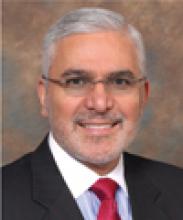Beneath the current haze of the election buzz, a national anticipatory panic is building up because of the looming “fiscal cliff,” when massive government budget cuts are expected to have grave ramifications and bleak economic and existential repercussions.
Individuals from all political affiliations are frantically demanding that lawmakers do something to avoid a disastrous plunge into chaos for government institutions.
Paradoxically and inexplicably, nothing is being done so far to circumvent this impending doom scenario. A sword of Damocles is hanging over the nation, held, as the legend goes, at the pommel by a single hair of a horse’s tail!
I often feel that’s also what is happening in psychiatry. We are facing not 1, but multiple serious and disruptive challenges, crises, and threats to our profession and our patients. It evokes a grim image of multiple Damocles’ swords hanging over us. We do not seem to be doing anything tangible to avoid these dangerous and injurious swords. I quietly fear that living in imminent danger has become the “new normal” for psychiatry. That’s actually a euphemism for “massive denial.” We all seem to be going on with our lives as if we are not heading to our own version of a “fiscal cliff.” The apathy, inaction, and lack of a sense of urgency by “organized psychiatry” are astonishing, given the critical need for urgent action.
Consider the following swords of Damocles hanging over psychiatry:
- Down-to-the-bone budget cuts in public psychiatry with inadequate resources in community mental health and public hospitals.
- Severe bed shortages: psychiatry has dropped from the most overbedded medical specialty in the 1960s to the most underbedded one, with devastating adverse effects on acutely ill patients who need inpatient treatment.
- Unabating incarceration and criminalization of seriously mentally ill patients as a substitute for hospitalization or care at residential facilities.
- A chronic shortage of psychiatrists, which is fueling the argument by some mental health professions with no medical or advanced nursing background that they should be permitted to “acquire” prescription privileges, as if prescribing is a skill independent from the extensive training of 4 years of medical school plus 4 years of psychiatric training. The consequences for disabled patients will be low-quality, even dangerous care.
- The low rate of medical students choosing psychiatry as a career. The shortage of psychiatrists will worsen if attrition from retirement or mortality is not offset by substantial annual infusions of newly minted psychiatrists.
- The deplorably short life span of patients with severe mental illness—25 years less than non-mentally ill individuals—mainly attributable to excess cardiovascular risk and lack of access to adequate primary care as part of community mental health management.
- An anemic pipeline of psychiatric residents choosing careers as teachers or researchers. Huge student loans and lack of mentorship are only some of the reasons residents select clinical work over academic careers.
- Withdrawal of several major pharmaceutical companies from research and development to discover new psychiatric drugs. It would be more judicious to engage and partner with them instead of demonizing them simply because they are the only entities that design, develop, test, and produce psychiatric medications. The unmet needs in psychiatry are enormous, especially because 80% of DSM-IV-TR psychiatric disorders have no FDA-approved medication.
- A lack of coalescence and cohesiveness of psychiatrists in the United States. We have fragmented into small organizations and factions, speaking with several faint voices instead of one powerful voice. Other disciplines are far better organized and can lobby more effectively for their causes.
- A lack of participation by psychiatrists in their professional organizations and low support for political action committees to navigate the agenda of psychiatry at the local, state, and national levels. The image and influence of psychiatry can be bolstered only by ongoing member donations and the reverse will occur without consistent member support.
- The persistent stigma of mental illness that continues to haunt our patients, inhibits treatment-seeking, and undermines treatment adherence. Despite magnificent advances in the medical basis of mental disorders, psychiatric illnesses are not regarded with the same acceptance and understanding as other medical disorders.
- A frustrating lag in translating the veritable explosion in basic neuroscience discoveries into clinical applications for diagnosis or therapeutics. Psychiatry could benefit greatly if a sufficient number of well-funded translational researchers get involved. A partnership between the National Institute of Mental Health (NIMH)and the pharmaceutical industry can expedite this translation, but has yet to happen.
This list of “dangling swords” may appear daunting and overwhelming but if we shed our apathy and unite, we can parry their threats and emerge stronger. I do not claim to have the answers but I do have an abiding faith in the collective wisdom and abilities of my fellow psychiatrists, if they decide to mobilize. The root of our “fiscal cliff” is our chronic inaction, passivity, and lack of cohesiveness and a passionate pursuit of our shared goals. We better wake up and act soon before these Damocles’ swords start falling and inflicting their exquisite pain.


